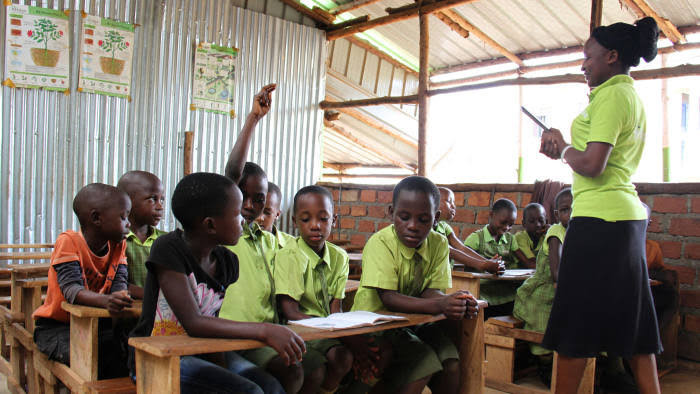KAMPALA, UGANDA: At least half of the learners who were in Primary three at the time of school closures in March 2020, cannot identify or recognize letters of the alphabet. This is according to a survey carried out by Uwezo Uganda, in its ninth National Learning Assessment Report dubbed, ‘Are Our Children Learning?’
The findings are based on the household assessment to test children’s basic literacy and numeracy skills conducted between August and September 2021. It involved 870 volunteers and 29 village coordinators who visited 5,673 households and surveyed 15,033 children in 435 villages in 29 nationally represented districts.
According to the report, a staggering 50.7 percent of children who were in primary three could not identify letters of the alphabet and therefore are categorized as non-readers, while 31.3 percent of the same group of learners could not attempt simple numeracy tasks.
Uwezo Uganda Executive Director Dr Mary Goretti Nakabugo, says the 2021 Uwezo findings suggest that the learning by younger children has been delayed more by the pandemic and closures than that of older children. To her, findings are predicting doom for the future of education in the country as the foundation level has been shaken worsening the already waning learning outcomes in early grade levels.
Dr Nakabugo partly blames the declining learning outcomes at the lower levels during school closures on the poor COVID-19 education response and recovery plan that neglected learners in lower classes giving priority to their counterparts in higher classes, yet the former needed much help.
She pointed out that unlike other countries whose focus was put on lower learners, the Ministry of Education and parents completely neglected these lower classes given the fact that learners from pre-primary to Primary three never returned to school. According to her, learners were still mastering the literacy and numeracy skills and after a long period of time outside of school, they have ended up forgetting everything.
However, Robert Ikwap, the Assistant Commissioner in charge of Primary Education says that although the findings are pointing to the right challenge, the blame should not be apportioned to the Ministry of Education. He says that in their response and recovery program, they had catered for lower classes but some of their arrangements were disorganized by circumstances.
“It’s true that the lower grader (classes) never had physical teaching and learning since March 2020. We had planned for them. Before they could return to school, the second wave of the pandemic befell us. We had to protect them from the disease,” he said.
But Dr Nakabugo says that with the report released, the blame game should end. This will allow everyone to start thinking about how to solve the current problem by ensuring that learners acquire basic numeracy and literacy skills to set a firm foundation.
Grace Baguma, the Director of the National Curriculum Development Centre agrees with Nakabugo saying that while planning and teaching, more emphasis and resources need to be focused on literacy and numeracy at the lower levels to ensure that the foundation for future learning is strong.
The curriculum expert notes that at lower levels teachers need to apportion more time on numeracy and literacy than any other activities. She says that to achieve these, the National Curriculum Development Centre under the abridged curriculum has already apportioned more periods for the two learning areas in question.
Although the learning outcomes at lower levels dropped, the report indicated that the school closure period has come with unexpected gains with children who can read and comprehend a P2 English story and do P2 division for the whole set of grades (P3-7) increased from 26 percent to 32 percent. Dr Nakabugo says that the improvement could be a result of gains made before the pandemic started.
She however points out that it’s critical to observe that children at higher levels have been able to build on the basic skills in spite of the school closures. According to the Uwezo data analysis, the findings on learning suggest that some improvements were made before the pandemic (in 2018-20) in the pace of children’s progress towards foundational reading and numeracy competence. This means that those who had acquired these competencies retained them despite the prolonged school closure.
But Nakabugo notes that the percentage of learners with basic competencies is generally still low when compared to other countries.
Meanwhile, the report also points to another big monster in the room which is over age learners. According to the report, the pandemic aggravated the over-age problem that was already considerable. For example, 39 percent of P1 children surveyed were aged eight years old, compared to 33 percent in 2018. The right age for P1 is six years.
The Uwezo report recommends that these problems need to be critically solved given the fact that research has proved that there is a likelihood of the learners who don’t learn at their right age eventually dropping out of the school completely before even reaching Primary seven.
The over-age problem has been giving parents sleepless nights as school reopening approaches. And after reopening many parents have been struggling to ensure that their children skip two classes to catch up with the class they would be going for if the school had not closed. But Dr Nakabugo says that automatic promotion of the learner might not be the solution but progress should be made with efforts laid to help the learner acquire the required competencies.
If you would like your article/opinion to be published on Uganda’s most authoritative news platform, send your submission on: [email protected]. You can also follow DailyExpress on WhatsApp and on Twitter (X) for realtime updates.



